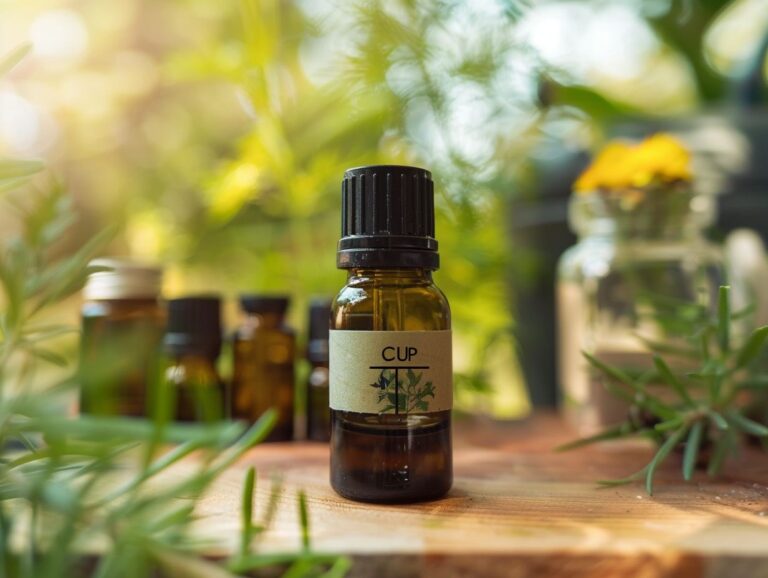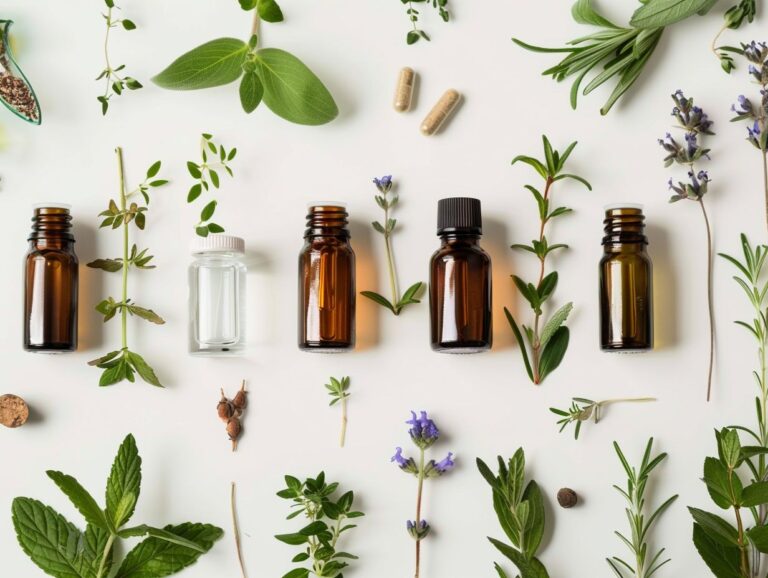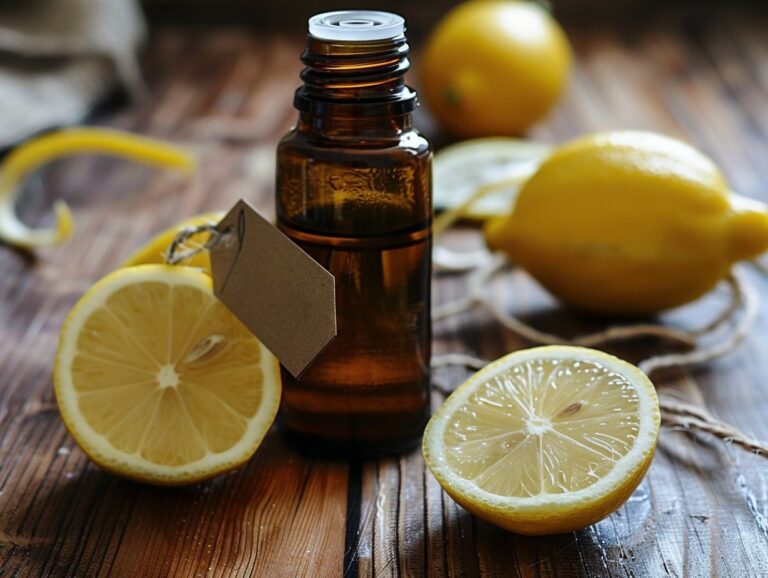Are Essential Oils Organic
Curious about essential oils and what it means for them to be organic?
In this comprehensive guide, we will explore the world of essential oils, from their production to the benefits of using organic options.
Discover the differences between organic and non-organic essential oils, learn about regulations in place, and find out how to identify if an essential oil is truly organic.
Explore popular organic food grade essential oils and their uses, and gain insight into the risks of using non-organic alternatives.
Join us as we delve into the world of organic essential oils!
Key Takeaways:
1.
2.
3.
What Are Essential Oils?
Essential oils are concentrated liquids extracted from plants that capture their aromatic essence. They are the purest form of a plant’s fragrance and have been used for centuries in various cultures for their therapeutic and aromatic properties.
Historically, essential oils have played a significant role in traditional medicine and wellness practices, dating back to ancient civilizations such as Egypt, China, and India. The extraction methods used to obtain these oils vary, with common techniques including steam distillation, cold pressing, and solvent extraction. Each method results in different types of oils with unique compositions.
Organic essential oils, in particular, are gaining popularity due to their natural and chemical-free nature, often derived from plants grown without pesticides or synthetic fertilizers. These oils are known for their potent therapeutic benefits and are widely used in aromatherapy for stress relief, relaxation, and overall well-being.
What Is Organic?
Organic refers to a cultivation practice that relies on sustainable and natural methods to grow crops without the use of synthetic chemicals or genetically modified organisms (GMOs). Organic products are USDA certified and adhere to stringent quality checks to ensure they meet specific standards set by regulatory bodies.
These stringent quality checks encompass various aspects, including soil health, water quality, and pest management practices. USDA certification plays a vital role in verifying that these products are indeed organically grown, giving consumers assurance about the authenticity of their purchases. The principles of organic farming prioritize environmentally friendly techniques that promote biodiversity, soil fertility, and overall sustainability. By choosing organic products, consumers not only support healthier farming practices but also contribute to reducing their exposure to potentially harmful chemicals commonly used in conventional agriculture.
What Are Organic Essential Oils?
Organic essential oils are derived from plants that have been grown using organic farming practices and are certified by the USDA. These oils are produced without synthetic pesticides or fertilizers, ensuring a pure and non-toxic aromatic experience.
For essential oils to be classified as organic, the plants from which they are extracted must be grown without the use of synthetic chemicals or genetically modified organisms. This ensures that the oils are free from harmful residues and maintain their natural purity and therapeutic properties. Choosing organic essential oils not only benefits the environment by supporting sustainable farming practices but also offers consumers a higher quality product with potent fragrance and healing benefits.
The standards for USDA certification of organic essential oils are stringent, requiring adherence to strict guidelines throughout the production process. From seed to bottle, every stage must meet the rigorous criteria set by the USDA to ensure the integrity and purity of the final product. This certification provides consumers with the assurance that they are purchasing a genuine organic product that complies with the highest standards of quality and sustainability.
How Are Essential Oils Made?
Essential oils are extracted from plants through various methods such as steam distillation, cold pressing, or CO2 extraction. Each method preserves the aromatic compounds of the plant in different ways, ensuring the final product meets the quality standards required for USDA certification.
Steam distillation, the most common method, involves passing steam through plant material, releasing essential oils that are then condensed. On the other hand, cold pressing is often used for citrus oils, where the oils are extracted by pressing the fruit rinds. In comparison, CO2 extraction uses pressurized carbon dioxide to extract oils without heat, resulting in a highly concentrated and pure product. It is crucial for manufacturers to follow updated certified processes to maintain the integrity and quality of the essential oils, especially when aiming for USDA certification.
What Are the Differences Between Organic and Non-Organic Essential Oils?

Organic essential oils are typically derived from plants that are grown in eco-friendly environments, using natural fertilizers and pest control methods. This natural cultivation process not only benefits the environment but also results in higher quality oils. On the other hand, non-organic oils can sometimes lack the same level of purity due to potential exposure to harmful chemicals during cultivation.
In terms of labeling, organic essential oils are required to meet specific criteria set by certifying bodies to display the ‘organic’ label. This certification indicates that the product has undergone rigorous quality checks and conforms to organic farming standards. Consumers rely on these labels to make informed choices and trust that they are purchasing a genuine organic product.
Are Essential Oils Regulated?
Essential oils are regulated by various organizations to ensure consumer safety and product quality. These regulations govern aspects such as sourcing, production, labeling, and marketing practices within the industry.
One of the key governing bodies overseeing the regulatory framework for essential oils is the International Organization for Standardization (ISO), which sets international standards to guarantee the purity and quality of these aromatic extracts. The Food and Drug Administration (FDA) in the United States and the European Medicines Agency (EMA) in Europe play crucial roles in regulating essential oils’ safety and efficacy.
Producers must meticulously adhere to these standards to maintain the integrity of their products and build consumer trust. By ensuring compliance with these regulations, both producers and consumers can have confidence in the quality and effectiveness of essential oils available in the market.
What Organizations Regulate Essential Oils?
Essential oils are regulated by prominent organizations such as the US Department of Agriculture (USDA) and the National Organic Program (NOP) to ensure compliance with quality standards and organic certifications. These regulatory bodies play a crucial role in overseeing the production and labeling practices of essential oil manufacturers.
The USDA is deeply involved in setting and enforcing the standards for organic production, ensuring that essential oils are derived from plants grown without synthetic fertilizers, pesticides, or genetic engineering. On the other hand, the NOP specifically focuses on certifying organic products, including essential oils, based on rigorous criteria to guarantee their purity and sustainability. Together, these organizations work hand in hand to uphold the integrity of the organic certification process and safeguard consumers from misleading claims in the essential oil industry.
What Standards Do Organic Essential Oils Have to Meet?
Organic essential oils must meet stringent standards set by the USDA to attain certification. These standards encompass the entire production process, from cultivation practices to labeling requirements, ensuring that the final product aligns with sustainable and natural principles.
For an essential oil to receive USDA certification as organic, it must be extracted from plants grown without synthetic pesticides, herbicides, or genetically modified organisms (GMOs). The extraction process should be free from artificial additives or preservatives, maintaining the purity and potency of the oil. Quality checks are integral to the certification process, guaranteeing that the oil is free from contaminants and meets the strict criteria for organic products. Farmers must adhere to organic farming methods, such as crop rotation and composting, to maintain soil fertility and promote biodiversity.
What Are the Benefits of Using Organic Essential Oils?
Using organic essential oils offers numerous benefits for both physical and emotional well-being. These oils promote a plant-based lifestyle, support overall health, and provide a natural, non-toxic alternative for aromatic experiences.
Organic essential oils are extracted from plants without the use of synthetic chemicals, pesticides, or additives, ensuring purity and potency. When inhaled or applied topically, these oils can help reduce stress, improve sleep quality, alleviate headaches, and even boost immunity. Research suggests that certain essential oils possess antimicrobial properties, aiding in fighting off pathogens and supporting respiratory health. By incorporating organic essential oils into your daily routine, you can enhance your well-being through the power of nature’s gifts.
What Are the Risks of Using Non-Organic Essential Oils?

When essential oils are not produced organically, they run the risk of carrying harmful residues that may have adverse effects on one’s well-being. These contaminants can interfere with the oil’s natural composition, diminishing its therapeutic benefits and potentially causing health concerns. In contrast, certified organic essential oils undergo strict quality assurance measures to ensure they meet rigorous standards, free from harmful substances. Consumers should prioritize these high-quality options to avoid potential health hazards associated with non-organic alternatives.
How Can You Tell if an Essential Oil is Organic?
Identifying whether an essential oil is organic involves examining the labeling on the product. Look for specific certifications such as USDA Organic or other accredited labels that indicate the oil has met the required standards for organic production.
When reading the label, pay attention to phrases like ‘100% organic’ or ‘certified organic,’ as these signify that the oil has been produced without the use of synthetic pesticides or fertilizers. Furthermore, organic labels should display the certifying agency’s logo or stamp, providing assurance of the oil’s purity. To delve deeper, you can cross-reference the certification symbol on the label with the respective organization’s database to verify the authenticity of the organic claim.
What to Look for on the Label?
When examining the label of an essential oil, look for key information such as the organic certification seal, the plant species name, and any additional health warnings or usage instructions. These details can help consumers make informed choices about the quality and authenticity of the product.
Along with the organic certification seal, it is crucial to scan the label for the specific plant species name as this ensures you are getting the intended benefits of that particular plant’s oil.
Be vigilant for any health warnings or usage instructions provided on the label, which are essential in understanding potential risks and proper application methods. Learn more about essential oils.
The presence of an organic certification seal signifies that the product has met stringent guidelines set by certifying bodies, guaranteeing purity and quality standards.
How to Verify Organic Certification?
Verifying the organic certification of essential oils involves checking for official seals from certifying bodies like the USDA or Quality Assurance International (QAI). Consumers can consult the FDA or Health Canada databases to confirm the legitimacy of certification claims.
When examining essential oils for authenticity, it’s crucial to look for specific labels denoting organic certification to ensure the purity and quality of the product.
- One effective way is to visit the websites of recognized certifying entities like USDA or QAI and cross-reference the provided certification numbers with their databases.
- Consumers can also reach out to these certifying bodies directly for confirmation of certification status if there are any doubts or discrepancies in the labeling.
- The FDA plays a pivotal role in overseeing product standards and ensuring compliance with regulatory requirements, underscoring the importance of relying on legitimate certifications for essential oils.
What Are Some Popular Organic Essential Oils?
Several popular organic essential oils include Lavender, Peppermint, Tea Tree, and Eucalyptus, each offering unique aromatic experiences and a range of therapeutic benefits. These oils are commonly used in aromatherapy, skincare, and holistic wellness practices.
For example, Lavender essential oil is known for its calming properties, making it a go-to option for relaxation and stress relief. Peppermint oil is often used to boost energy and aid digestion, while Tea Tree oil is prized for its antibacterial and antifungal qualities, making it a top choice for treating skin conditions.
Additionally, Eucalyptus oil is famous for its ability to clear congestion and promote easy breathing, commonly used in steam inhalations during cold and flu seasons. The versatility of these essential oils extends beyond their pleasant scents, as they play a crucial role in enhancing overall well-being in both physical and emotional realms.
What Are Their Uses and Benefits?

Each of these essential oils offers distinct benefits for both physical and emotional well-being. Lavender, known for its calming effect, is often used in aromatherapy to reduce stress and anxiety. It can also help with headaches and minor skin irritations.
essential oils floral, with its refreshing scent, is great for improving focus and boosting energy. It is widely used to alleviate nausea and soothe muscle aches and pains.
Tea Tree oil is renowned for its antimicrobial properties, making it a popular choice for treating acne and minor skin infections. It can also be used as a vegan essential oil natural household cleaner.
Eucalyptus oil is commonly used to relieve congestion and promote easier breathing, especially during cold and flu seasons. Its invigorating aroma is also beneficial for essential oil benefits.
Frequently Asked Questions
Are Essential Oils Organic?
Yes, essential oils can be organic if they are extracted from plants that have been grown without the use of synthetic pesticides, fertilizers, or other harmful chemicals.
What does it mean for an essential oil to be organic?
An essential oil is considered organic when the plants used to make it are grown in accordance with organic farming practices, without the use of synthetic chemicals.
How can I tell if an essential oil is organic?
Look for a certified organic label on the essential oil bottle or check the company’s website for information on their farming and production practices.
Are all essential oils labeled as organic actually organic?
No, not all essential oils labeled as organic may actually be organic. It’s important to do your research and look for a certified organic label to ensure the oil is truly organic.
Can essential oils be labeled as natural and organic?
Yes, some essential oils may be labeled as both natural and organic, but it’s important to read the label and check for a certified organic label to confirm their organic status.
Is there a difference in quality between organic and non-organic essential oils?
The quality of essential oils can vary regardless of whether they are organic or non-organic. It’s important to choose a reputable brand that sources their oils from high-quality plants, whether they are organic or not.








9 Comments